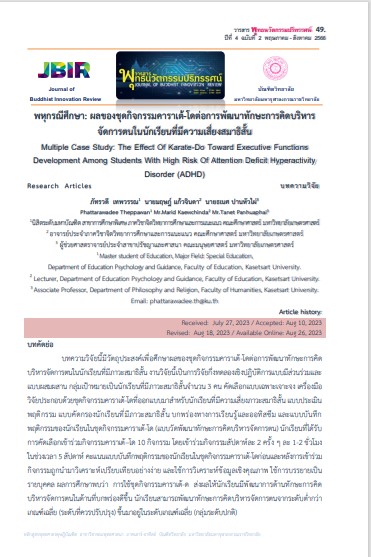Multiple Case Study: The Effect of Karate-Do toward Executive Functions Development among Students with High Risk of Attention Deficit Hyperactivity Disorder (ADHD)
Main Article Content
Abstract
Abstract
This research study had one objective which is to investigate the effect of Karate-Do program on the executive functions development among students with high risk of ADHD. This study is a quasi-experimental participatory action research and mixed method design. The selected subjects of this study included 3 elementary students with high risk of ADHD. Research instruments are the Karate – Do program, the Behavioral Assessment, KUS-SI Rating Scales: ADHD/LD/Autism/PDDs, and the Behavioral Report for Karate – Do (The Executive Functions Assessment, EF). Then, an appearance was exhibited in the score with both the pretest and the posttest after utilizing the proposed planning from Practicing Karate – Do.
Those selected students had attended 10 activities of the Karate – Do program for 5 weeks, twice a week, 1-2- hours each. The pre-test and the post-test scores of Behavioral Report for Karate – Do were simply compared, and the individual descriptive analysis was utilized.
The results revealed that the Karate – Do program could enhance the ability of EF Development among students. Students could develop the EF skills from the below-average level (needs improvement) to the average level (normal level).
Keywords: Karate-Do; Executive Functions Development; Attention Deficit Hyperactivity Disorder
Article Details

This work is licensed under a Creative Commons Attribution-NonCommercial-NoDerivatives 4.0 International License.
เรื่องลิขสิทธิ์/เป็นความคิดเห็นของผู้เขียน
References
เอกสารอ้างอิง :
หนังสือ :
Herman Kauz. (1986). Dynamic KARATE: INSTRUCTION BY THE MASTER. Tokyo, Japan: Kodansha International Ltd. Trans. Masatoshi Nakayama. n.d. Dynamic KARATE: INSTRUCTION BY THE MASTER. n.p.
Masatoshi Nakayama. (1977). Best Karate 1 Comprehensive. Tokyo, Japan: Kodansha International Ltd.
วารสาร :
Diamond, A., & Lee, K. (2011). Interventions Shown to aid executive function development in children 4 to 12 years old. Science, 333 (6045), 959-964.
Lima et al. Practicing karate may improve executive functions of 8-11-year-old school children. Journal of Physical Education and Sport (JPES), (2017); 17 (4), 2513-2518.
สื่ออิเล็กทรอนิกส์ :
ไทยพีบีเอส. เด็กไทยป่วย "สมาธิสั้น" กว่าล้านคน. (ออนไลน์). แหล่งที่มา www.thaipbs.or.th/news วันที่สืบค้น 26 มิถุนายน 2566)
Japan Karate Association. (n.d). Information Guidebook. (ออนไลน์). แหล่งที่มา www.jka.or.jp (วันที่สืบค้น 6 ตุลาคม, 2561)
Reference :
Book :
Herman Kauz. (1986). Dynamic KARATE: INSTRUCTION BY THE MASTER. Tokyo, Japan: Kodansha International Ltd. Trans. Masatoshi Nakayama. n.d. Dynamic KARATE: INSTRUCTION BY THE MASTER. n.p.
Masatoshi Nakayama. (1977). Best Karate 1 Comprehensive. Tokyo, Japan: Kodansha International Ltd.
Journal :
Diamond, A., & Lee, K. (2011). Interventions Shown to aid executive function development in children 4 to 12 years old. Journal Science. 333 (6045); 959-964.
Lima et al. (2017). Practicing karate may improve executive functions of 8-11-year-old school children. Journal of Physical Education and Sport (JPES). 17(4); 2513-2518.
Electronic media :
Thai PBS. Over one million Thai children suffer from ADHD. (Online). Available at www.thaipbs.or.th/news. (Accessed 26 June 2023)
Japan Karate Association. (n.d). Information Guidebook. (Online). Available at www.jka.or.jp (Accessed 6 October 2018)


